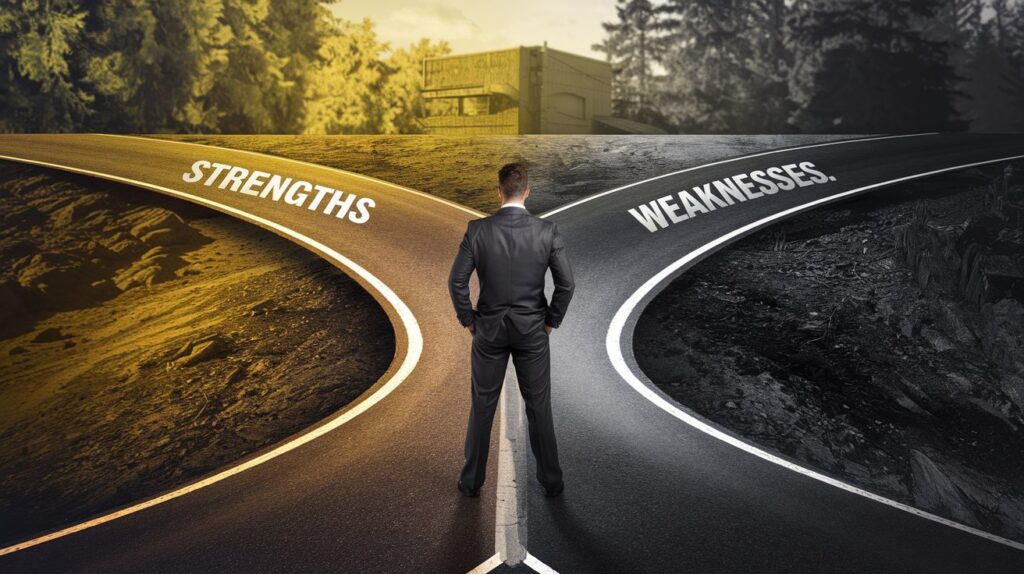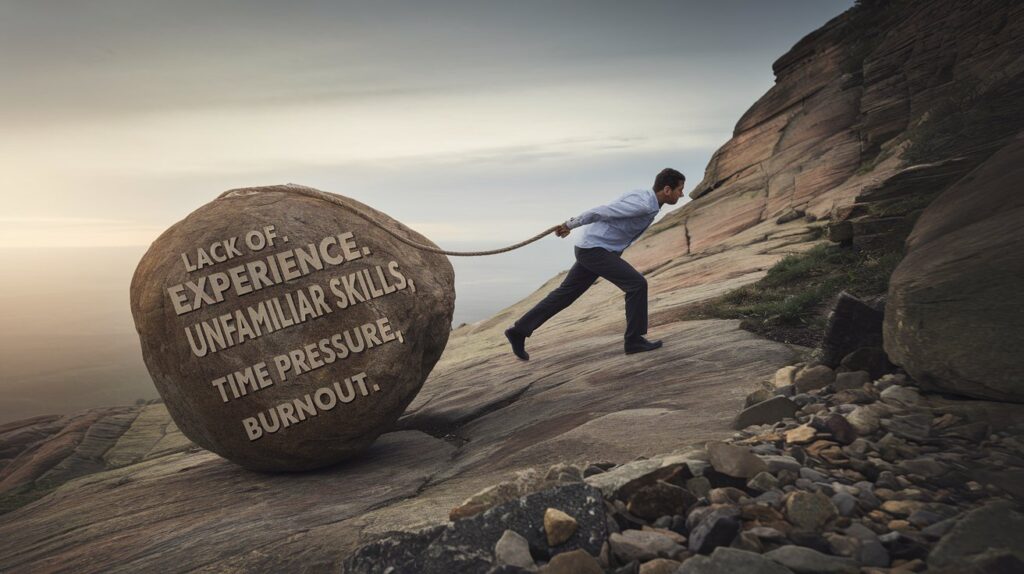StartUp World– In May 2020, I began my entrepreneurial journey with a heart full of ambition and optimism. Four years later, I’ve found myself reflecting on why I haven’t reached the goals I initially set. After much self-reflection and research into the lives of other successful founders, I realized one thing: my limitations have been the root cause of the slower-than-expected progress.
But this insight has led me to an even more important realization—when starting a business, you must always align your startup with your strengths, where you can work with ease and confidence. This article combines my personal experience and insights from the journeys of other entrepreneurs in business world to provide you with valuable lessons on navigating limitations and starting in your area of strength.

1. Startup Founders’ Limitations: A Starting Point for Self-Awareness
Every founder brings unique strengths and weaknesses to the table. Identifying these limitations is the first step toward entrepreneurial success. Ignoring them, however, can lead to slow growth, operational inefficiencies, and ultimately, failure. While it’s tempting to jump into an industry or idea just because it seems lucrative, understanding how your own strengths and limitations impact your working style is critical to get successful in business and scale the operations of your company.

Real-Life Example: Evan Spiegel – Snap Inc.
Evan Spiegel, co-founder of Snap Inc., struggled with leadership and operational management early on, which affected the company’s growth. Recognizing these weaknesses, Spiegel surrounded himself with experienced executives to fill the gaps in his skills. By addressing his limitations and focusing on his strengths in product development, he was able to steer Snap toward success.
2. The Power of Starting in Your Strong Area: My Personal Journey
After four years of working on my business, I realized that one of the reasons I hadn’t achieved my goals was because I ventured into areas outside my core strengths. Passion alone wasn’t enough. I had to spend considerable time learning skills that didn’t come naturally to me, which slowed my progress and drained my energy. This is a mistake many founders make—they jump into an idea they’re passionate about but don’t have the skillset for, which leads to unnecessary struggles.

Key Takeaways for Aspiring Entrepreneurs
As you consider launching your own start-up, here are a few key takeaways from my personal journey:
- Self-Assessment: Take the time to evaluate your strengths and weaknesses. Understand what you excel at and how you can leverage those skills in your business.
- Embrace Limitations: Acknowledge your limitations and don’t be afraid to delegate or seek help in areas that aren’t your forte.
By studying the journeys of other founders, I’ve learned that the most successful entrepreneurs are those who build businesses in their areas of strength. When you work from a place of expertise, your decisions come more naturally, challenges are easier to overcome, and the path to growth is clearer.
Real-Life Example: Sara Blakely – Spanx
Sara Blakely started Spanx not in an unfamiliar industry but in an area where she understood the product and its potential impact on women. She worked on Spanx during hours that worked for her as a mother, demonstrating that starting a business in your strong area allows for flexibility and long-term resilience. Blakely didn’t have to master entirely new skills—she worked with ease because her idea aligned with her strengths.
3. How Limitations Affect Working Style and Growth

Your limitations as a founder directly affect your startup’s working style, growth, and eventual success or failure. Founders with experience and expertise in their field tend to make quicker decisions, respond to market changes with agility, and drive innovation. On the other hand, founders who enter unfamiliar industries often spend excessive time learning, making mistakes, and correcting them, which can slow down growth.
Real-Life Example: Howard Schultz – Starbucks
Howard Schultz had a strong vision for expanding Starbucks beyond a local coffee shop. However, Schultz was aware of his limitations in managing a large-scale corporation. By hiring skilled leaders to handle operations, Schultz focused on what he did best: branding and customer experience. His ability to acknowledge his limitations and delegate operational responsibilities helped Starbucks scale into a global giant.
4. Married Founders and Family Responsibilities

For married founders or those with families, time management becomes one of the biggest challenges. Balancing personal and professional life can significantly impact the working style and pace of the startup’s growth. Family responsibilities can limit the time founders dedicate to their startups, which affects decision-making speed and availability for critical business activities.
Real-Life Example: Phil Knight – Nike
Phil Knight, co-founder of Nike, managed the delicate balance of family life and business. He had to travel extensively, often away from his family, which placed enormous pressure on him. Knight’s success came from a strong support system at home and a clear delegation of responsibilities in the company, enabling him to focus on high-impact areas while ensuring his family was taken care of.
- Time Constraints: Married founders or those with children often have less time to dedicate to long work hours, which can slow down decision-making and execution.
- Emotional Pressure: Balancing family responsibilities with the demands of a startup can add emotional stress, which can lead to burnout if not managed well.
5. Women Founders: Facing Gender Bias and Family Responsibilities

Women founders often have the dual burden of facing gender bias in the business world while also managing family responsibilities. These additional pressures can slow down their entrepreneurial journey, making it harder to network, secure funding, or devote long hours to work. However, women who lean into their strengths and balance their personal lives effectively often turn these challenges into success stories.
Real-Life Example: Whitney Wolfe Herd – Bumble
Whitney Wolfe Herd, founder of Bumble, faced gender-based challenges early in her career. Yet, she used these experiences to build Bumble, an app that empowers women to take the lead in online dating. As a mother, she had to balance family responsibilities while running a fast-growing tech company. By focusing on her core strength—understanding social dynamics and advocating for women—Wolfe Herd successfully scaled Bumble into a billion-dollar business.
6. Health Limitations: The Importance of Self-Care
Founders often work relentlessly to build their startups, sometimes to the detriment of their health. Ignoring physical and mental well-being can lead to burnout, fatigue, or more serious health issues, which can slow down or derail a startup entirely. Recognizing your own physical and mental limits and prioritizing health is critical for long-term success.

Real-Life Example: Arianna Huffington – Thrive Global
Arianna Huffington collapsed from exhaustion while running The Huffington Post, an experience that led her to rethink her work-life balance. She later founded Thrive Global, a company focused on health and wellness, highlighting the importance of taking care of one’s well-being while managing a business.
7. Time and Energy: The Most Valuable Resources
Time and energy are finite, and founders must use them wisely. Spending too much time learning new skills instead of leveraging existing ones can slow down progress and lead to frustration. Founders who start in their strong areas can allocate their time more effectively, making quicker decisions and accelerating growth.
8. Final Takeaway: Start in Your Strong Area
One of the most important lessons I’ve learned from my own journey and from studying other successful founders is this: always start your startup in your area of strength. When you build your business based on what you already excel at, everything else becomes easier. You’ll be able to navigate challenges more smoothly, grow faster, and work with confidence.
Whether it’s Steve Jobs’ expertise in product design, Elon Musk’s engineering brilliance, or Sara Blakely’s understanding of her product, the founders who succeed are those who start with their natural talents. They work with ease, save time, and avoid the burnout that comes from constantly trying to overcome their weaknesses.
So, before you dive into your startup, take a step back and assess your strengths. What comes naturally to you? Where can you contribute the most value? Build your business from that place of strength, and you’ll be well on your way to success.